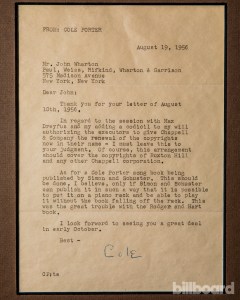Record Labels
Page: 17
As of January, Warner Music Group (WMG) executive vp/general counsel Paul Robinson has worked in the legal department of the company for 30 years. During that time, he has seen “three different owners, seven CEOs and we’ve gone private and public two different times,” he says. “There also have been all of these macro changes in the music business” — which is something of an understatement. What hasn’t changed much, he says, is the culture of the company: “It’s always been an artist- friendly, songwriter-friendly culture, and we’ve always had a great relationship between recorded music and publishing.”
Robinson was slated to receive the 2025 Entertainment Law Initiative Service Award on Jan. 31 at the organization’s annual Grammy Week luncheon at the Beverly Wilshire Hotel. But since the event was canceled in the wake of the Los Angeles wildfires, he will receive the honor at next year’s gathering.
Trending on Billboard
Robinson started at WMG in 1995 after working at Mayer Katz Baker Leibowitz, which at the time did a significant amount of the label group’s legal work. Robinson got the top job in 2006 and helped steer the company through the worst years of the music business, to its 2013 acquisition of Parlophone Label Group from Universal Music Group, and into the streaming-led recovery and a successful 2020 initial public offering.
Like the rest of the industry, WMG is now at a point where streaming growth in developed markets is slowing and the challenges of artificial intelligence (AI) loom — and in a way that will especially test it as the smallest of the three majors. Which is why, Robinson says, “From my point of view, it’s important to be perceived as, and to be, the most artist-friendly, songwriter-friendly company” — a message that WMG sent by being the first major to adopt artist-friendly policies on “digital breakage” in 2009 and on sharing gains from equity sales, such as with Spotify in 2016. “Jac Holzman, when he started Elektra, used to have this love-and-affection clause in his contracts that said the label will treat artists with love and affection and the artist will treat the label with a modicum of respect,” Robinson recalls. “And it’s great because it brings to mind the imbalance: Artists will not always love their labels, but we always have to love them and we hope that they at least respect us.”
Your father is Irwin Robinson, the prominent publishing executive who ran Chappell/Intersong and then EMI Music Publishing. Did you purposefully decide to follow him into the same business?
That was how it ended up, but they say there are no accidents. In some ways, I was afraid to go into the music business. There were huge shoes for me to step into. I thought I wanted to be a doctor, and then I worked at a hospital one summer and I decided, “Maybe I don’t want to be a doctor.” I was a huge music fan as well as a singer, and I thought, “I’ll just go to law school and see what happens.” Maybe I was avoiding it.
Robinson’s father gave him this 1956 letter from legendary songwriter-composer Cole Porter to his lawyer, John Wharton, at Paul Weiss Rifkind Wharton & Garrison. “I like it because in a single letter, he talks about the relatively important issue of assigning his renewal rights to Chappell and the relatively unimportant issue of a songbook being able to stay on a piano rack,” he says. “God is in the details.”
Krista Schlueter
Billboard can reveal that you were the singer in a new wave band.
I was one of the singers. We were called The Doctors. The musicians in the band all wore scrubs, and we were the hit of Williams College campus for a year. In fact, they asked The Doctors to play at my college reunion and we’re doing it.
You’re one of the few people who has been in the same department at the same company since the Napster era. Any lessons from then on how the industry should deal with AI?
Probably to lean into change. Maybe there were people in 1999 at Warner Music Group who saw peer-to-peer coming, but I feel like we were caught very much off guard, and I don’t think that’s been the case with AI. Also, with peer-to-peer, there wasn’t a great deal around until iTunes in 2003, so we’re also in a better place that way. There are services we can strike deals with now.
What are the best- and worst-case scenarios for the industry for generative AI?
[That’s] probably less of a general counsel question than [one for] business development, but I think the worst-case scenario is that somehow it’s determined that you don’t need permission to train an AI model and the market is flooded with a huge volume of content that dilutes legitimate music, in the same way services are flooded now with music that very few people listen to — but in turbo. The best case is that AI becomes an incredible tool for artists and songwriters and lets them up their game and release content in languages they don’t speak.
“This is a 1994 photo from my wedding of
my then-partners from Mayer Katz Baker Leibowitz & Roberts and their wives,” he says. “WMG was Mayer Katz’s biggest client.”
Krista Schlueter
The streaming model seems to be evolving. There’s talk of “Streaming 2.0.” What kind of terms are you looking for now in streaming deals?
Trying to lock in per-subscriber minimums and reduce discounts for family plans and so on. That’s where we are focused.
When you started in the music business, there were six major labels. Now there are three. Does that change the nature of competition?
Even though there are only three majors, it feels like it’s never been more competitive. All you have to do is look at the change in artist deals over time.
I’m assuming you mean that deals now favor artists? Is it harder to invest in them under these circumstances?
No. Every year, our A&R spend increases. When I started, we were getting eight-album deals, but we were signing artists where, because there was no internet, their following was probably their hometown and they needed a huge amount of development. Today, we hardly ever sign an artist that doesn’t have a significant social media presence, and those artists don’t need as much development.
“Believe it or not,” Robinson says, he has had the same office chair for 30 years. “It definitely looks like a chair from 1995, but I just can’t seem to let go of it.”
Krista Schlueter
Now you also compete with distribution deals.
From an artist’s point of view, there’s a trade-off. In a distribution deal, you’re getting a bigger piece of the pie, but you’re getting less development and it’s a shorter-term relationship, so there’s probably not going to be as much investment. If you sign a frontline label deal, you’re committing to more albums and you’re getting a smaller piece of the pie, but you are getting a whole team of people behind you to develop your career. The great thing is that artists have more choice than ever.
How do you make sure artist contracts feel like win-win deals?
Deals get renegotiated all the time if they’re out of sync. If there’s an artist with a small record deal that has tremendous success, the economics of their next albums are going to look different. We’re in the personal services business and we’re in the relationship business. We want to maintain the best relationships with artists and songwriters.
Is there a deal you did that you’re especially proud of?
When we bought Parlophone Label Group, that was a huge regulatory fight, and I would say it was a win-win. UMG had to sell Parlophone, we were the best buyer, and they were looking for a good price, which today looks like a really low price. We paid about $800 million, probably about a seven-and-a-half times multiple, which at the time was huge. We were much more U.S. weighted in our revenue, and we bought a bunch of European assets. So it rebalanced us in terms of geography, and we acquired great repertoire and some great artists.
What has been some of the most memorable litigation that you have overseen? The case in which Led Zeppelin was sued for copyright infringement by a trustee for the estate of Spirit frontman Randy Wolfe comes to mind.
The exciting thing about the Zeppelin case was not only winning, after having been dealt a bunch of blows — we won in trial court and we were reversed — but changing the trajectory of copyright infringement litigation. It was a beat-back of what was, I think, the bad law of the “Blurred Lines” case.
Robinson never met Prince, but he is such a big fan that two people gave him signed limited-edition lithographs of the New Yorker cover commemorating the artist’s death. “He was an incredibly distinctive artist. For his first album, Warner Records let him do everything. They basically said, ‘Go in the studio and do it.’ That didn’t happen much in 1977.”
Krista Schlueter
This story appears in the Jan. 25, 2025 issue of Billboard.
BLACKPINK member JISOO has signed a global label deal with Warner Records for her solo output, the company announced Tuesday (Jan. 28). Warner will release JISOO’s debut solo mini album, AMORTAGE, on Feb. 14. “I’m excited about this new era and the continuation of my musical journey,” said JISOO in a statement. “I feel like […]
Universal Music Group chairman and CEO Lucian Grainge delivered an update on the company’s response to the Los Angeles wildfires on Tuesday, writing in a staff memo obtained by Billboard that while many evacuated employees have returned home, others remain displaced, while some have “lost their homes completely.”
Grainge said the Santa Monica-based company is actively supporting affected employees by providing resources to meet both immediate and long-term needs. Over 100 employees have volunteered to help colleagues through various means, such as offering shelter, babysitting and donating clothes, he said.
Beyond internal support, UMG has been involved in community relief efforts, including volunteering, providing meals and donating clothing and hotel rooms for displaced families. Additionally, Grainge said UMG has made financial contributions to several organizations supporting relief efforts, including the American Red Cross, California Community Foundation, The California Fire Foundation, Direct Relief, Entertainment Industry Foundation, L.A. Regional Food Bank, MusiCares, Music Health Alliance, Mutual AID Network L.A., Pasadena Humane Society and World Central Kitchen, among others.
Trending on Billboard
“What has impressed me the most throughout this tragic event is the fact that collectively we haven’t just made financial contributions, but so many of our colleagues have rolled up their sleeves and gone to work,” he said. “We know that even after every fire is extinguished the road to recovery will be very long. We will be there every step of the way.”
UMG announced earlier this month that it is canceling all of the company’s Grammy-related events, including its artist showcase and after-Grammy party, and will instead “redirect the resources that would have been used for those events to assist those affected by the wildfires.”
Read Grainge’s full memo below:
Dear Colleagues,
I’m writing to update you on our efforts related to the Los Angeles fires. In short, while many of our evacuated employees have fortunately been able to return to their homes, others who are in the most seriously affected areas remain displaced and will be so for some time to come. Some have lost their homes entirely.
We are working closely with those affected employees, providing them a range of resources and support to meet their immediate individual or family needs. Following meetings with the team of UMG leaders that I mentioned in my prior note, we are also determining the best ways to help these employees going forward. And in addition to the company’s support, more than 100 employees have volunteered to help their colleagues—from opening their homes to babysitting, dog walking, donating clothes, and more.
In terms of recovery of the broader community, from Day One we’ve been on the ground helping wherever we can. Whether it’s volunteering at relief organizations, providing meals to first responders and affected community members, donating clothing or providing hotel rooms to displaced families.
And in addition to all this, we’ve made financial contributions to a range of organizations, including the American Red Cross, California Community Foundation, The California Fire Foundation, Direct Relief, Entertainment Industry Foundation, L.A. Regional Food Bank, MusiCares, Music Health Alliance, Mutual AID Network L.A., Pasadena Humane Society, World Central Kitchen, and more.
What has impressed me the most throughout this tragic event is the fact that collectively we haven’t just made financial contributions, but so many of our colleagues have rolled up their sleeves and gone to work.
We know that even after every fire is extinguished the road to recovery will be very long. We will be there every step of the way.
You can read more about these efforts in our latest edition of our All Together Now bi-weekly newsletter.
I’m so enormously proud of the fact that so many of you have shown up to help our community and your colleagues. I’m grateful but not surprised. As a company, this is who we are.
Lucian
In the summer of 2006, Madonna touched down in New York for a run of shows at Madison Square Garden in support of her album Confessions on a Dance Floor. One young attendee was Val Blavatnik. “It was my first live-music experience and I was just so blown away,” he recalls. “I knew from then, even before our family acquired Warner, this was an industry I wanted to be involved in.”
Blavatnik’s father, Len, founder of Access Industries, subsequently bought Warner Music Group in 2011. A dozen years later, Val made good on his childhood dream, starting as senior director of business development at Warner Chappell Music. In April 2023, he was elected to WMG’s board of directors.
Val currently attends Harvard Business School, but he has been in close conversation with the company’s executive leaders, including his friend Elliot Grainge, the new chief executive of Atlantic Music Group. “Elliot and I got very close” during the negotiations that preceded WMG’s purchase of 51% of Grainge’s 10K Projects label in 2023, Val explains. “I advocated for the original 10K acquisition and for Elliot in his new role at Atlantic.” He clarifies, however, “As a board member, I am proud of my role, but it was [WMG CEO] Robert [Kyncl’s] decision.”
Trending on Billboard
You spent a few years at Warner Chappell and investment bank LionTree before joining the WMG board. Why was it the right time to make that move?
Well, I was very honored to be invited, and I take the responsibility extremely seriously. There are a wide range of perspectives on our board. It’s a very collaborative room to be in. Being the youngest person on the board, I’ve tried to make my role about bringing a different perspective to the conversation. I’m also one of the people on the board who has worked directly with artists, managing them, being in the studio, helping to sign them. That on-the-ground, in-the-room experience is vital.
How closely do you work with leadership?
Robert is always open-minded, and we have some fascinating and productive discussions. Learning about publishing from Guy [Moot] and Carianne [Marshall] was invaluable, and I’ve been very fortunate to work with Tom [Corson] and Aaron [Bay-Schuck] on signing two young acts we’re very passionate about. [Blavatnik declined to name the acts.]
I’m probably most involved with Atlantic. The team and I have a fantastic, ongoing open dialogue. I’m fortunate to be able to help in any capacity which benefits the business — from strategizing about the future, to helping close an artist signing, all the way through giving my two cents on a song.
Why is Grainge the right pick to lead AMG?
Elliot is an incredibly talented leader. It’s been an absolute pleasure to work and collaborate with him. Most importantly, artists love him, his team is unbelievably passionate and committed. He has brilliant creative instincts, he’s fantastic at creating huge cultural moments, and he has a deep grasp of business. That makes him a triple threat.
Do you think the music business needs a generational changing of the guard?
The music business should constantly evolve and innovate, like any other successful business. It’s not so much about a generational shift, but more about having executives with bold, fresh ideas and the ambition to deliver outstanding results.
This story appears in the Jan. 25, 2025, issue of Billboard.
In early December, Island Records co-chairmen/co-CEOs Justin Eshak and Imran Majid traveled to the north coast of Jamaica to visit the 87-year-old founder of the label they now run, Chris Blackwell. The executives were coming off one of the best years in Island’s recent history, and three weeks before their visit, two of Island’s recent breakthroughs, Sabrina Carpenter and Chappell Roan, both scored Grammy nominations in the categories of record, song and album of the year and best new artist — the first time in history a label had two acts nominated for each of those honors in the same year.
That wasn’t the reason for the trip, however. It was about “respect,” Majid says. The two had visited Blackwell at his Goldeneye resort in 2021, before they officially took over Island at the beginning of 2022, to meet him and pay homage to the institution he had launched in 1959, which became the label home of Bob Marley, U2, Cat Stevens and Grace Jones.
Trending on Billboard
This time, “It kind of felt like visiting family or a friend,” Eshak says. “As opposed to last time when we were like, ‘Oh, f–k!’ ”
During those three years, Eshak and Majid have taken Island from a label with an illustrious past but moribund present to one of the premier destinations for artists to break — and 2024 was when it all came together. First came Carpenter, who scored her first top 40 hit on the Hot 100 in January with “Feather” before steadily building momentum through the spring. “Espresso,” her first top 10, followed, and by June, Carpenter had her first No. 1 with “Please Please Please.” At the end of August, her album Short n’ Sweet debuted atop the Billboard 200.
Roan’s ascent was almost simultaneous, fueled by strong word-of-mouth and a series of increasingly bigger festival appearances that crested in the summer, when her single “Good Luck, Babe!” reached No. 4 on the Hot 100; her album, The Rise and Fall of a Midwest Princess, climbed into the top five of the Billboard 200; and she broke an attendance record for her Lollapalooza performance in Chicago. So when the Grammy nominations arrived, Island’s chief executives were not surprised. “Once the two of them started to control the zeitgeist,” Eshak says, “it just felt like the appropriate result.”
From the outside, the rise of the two artists — one a former Disney star who refashioned herself through clever live shows and radio, the other a budding queer pop icon who had been dumped by the major-label system early on and rebooted her career by touring and building a fan community — appeared to have reached that point through different paths. Eshak and Majid don’t see it that way. “You almost had to be at the shows before the success to understand,” Majid says. “That was what we bet on really early — [they were] artists that had such an engaged fan base from touring, streaming almost came secondary to that. At one point we were like, ‘Once this hits the masses, it could have a global impact.’ ”
By mid-2024, the narrative was set: Carpenter and Roan were leading a roster of artists who built cross-sectional fan bases that pushed beyond typical genre or cultural tropes. And for the first time in years, Island Records had returned to the roots Blackwell had nurtured in the latter half of the 20th century — a label where artists felt comfortable, heard and supported, and where good music was more important than commerciality.
Which is not to say that Island hasn’t succeeded commercially. The label ended 2024 with a 2.49% current market share — quadrupling the 0.62% it had in 2023. Island’s market share is included under Republic Records, but broken out on its own, it is the ninth-best of last year despite a wide reorganization at Universal Music Group in February that included extensive layoffs that affected all labels at the company.
Eshak and Majid’s greatest achievement, then, was to take a label with 30 dedicated employees (sharing some services like radio and marketing within REPUBLIC Collective) and create a culture that let its artists and staff flourish creatively, commercially and artistically.
They are now reaping the rewards. As 2024 wound down, new signees Gigi Perez and Lola Young landed their first Hot 100 hits, “Sailor Song” at No. 22 and “Messy” at No. 54, respectively.
Now, some in the industry are comparing Eshak and Majid’s success to that of John Janick’s at Interscope, which has turned young artists like Billie Eilish and Olivia Rodrigo into superstars at a time when it’s becoming increasingly difficult to break artists.
The trick is to maintain that success and future-proof against inevitable cold streaks. “What humbles you is when you think you have magic and it doesn’t work,” Majid says. “Justin and I are fortunate that we have 20 years of experience of what we think the right attitude to have is and what is not.”
“We just feel like there’s a new wave of artists that fit our ethos and that we can plug into what we do and give them a bespoke campaign,” Eshak says. “And we feel like we have the team. It felt really great going to Jamaica. Imran and I were sitting there like, ‘Our team’s got this.’ ”
This story appears in the Jan. 25, 2025, issue of Billboard.
Yo Gotti has welcomed another addition to the CMG family as Zillionaire Doe signs to the Memphis native’s imprint. Billboard learned on Tuesday (Jan. 21) that the ink is dry on the deal with the burgeoning Dallas-bred rapper, who looked up to Gotti growing up. “I’m really excited to work with Gotti and the CMG […]
Country radio is a notoriously tough nut to crack: Song campaigns can often last a year or more, and the journey to the top can be arduous — only to maybe taste a week or two at the summit. So when a song sticks atop the chart for a month or more, it’s worth noting.
That’s what’s happened with Koe Wetzel and Jessie Murph’s “High Road,” which this week spends its fifth week atop the Country Airplay chart — making it one of just six songs by artists with their first Country Airplay entries to spend five or more weeks atop the tally, and the first time two debutantes shared the honor. That’s a significant achievement on its own for RECORDS Nashville, the country imprint of Barry Weiss’ Columbia Records-affiliated label. But “High Road” reached the top immediately after a one-week No. 1 for George Birge with “Cowboy Songs,” another hit by the same label, giving RECORDS Nashville a run of six straight weeks atop the Country Airplay chart — and earning executive vp of promotion and commercial strategy Josh Easler the title of Billboard’s Executive of the Week.
Here, Easler talks about the success of “High Road,” the difficulty of running two chart-topping radio campaigns simultaneously and how the Country Airplay format has evolved during the course of his quarter-century in the music business. “It’s been wild to watch the format diversify in sounds over the last 25 years, and especially in the last decade,” Easler says. “The radio side of things has changed so much it’s hard to even know where to start there.”
Trending on Billboard
This week, Koe Wetzel and Jessie Murph’s “High Road” spent its fifth consecutive week at No. 1 on Country Airplay. What key decisions did you make to help make that happen?
The first key decision that led to “High Road” being a five-week No. 1 goes back to the summer when we agreed on a partnership with Columbia Records to be the promotion arm for this song at country radio. We are grateful that Ron Perry, Peter Gray and the leadership team at Columbia came together with Barry Weiss and trusted us to take this song to country radio. Another key decision was the timing for the record to peak. We knew that if we could get into No. 1 ahead of the holidays, we would likely have a multiweek run at the top due to how few playlist changes happen over the holidays. It worked out perfectly.
The run for “High Road” came immediately after another RECORDS Nashville release, George Birge’s “Cowboy Songs,” spent a week atop the chart, giving RECORDS six straight weeks at No. 1. How significant of an achievement is that for the label?
Having the songs go back-to-back was a very significant achievement for the label, especially because it was the first Billboard No. 1 for all of the artists. It’s certainly the greatest airplay achievement for RECORDS Nashville so far. No. 1 airplay singles are difficult, so having back-to-back No. 1s is really special.
How difficult is it to run concurrent radio campaigns at country radio for different artists like that?
Great question. Part of what made concurrent singles doable was how different the artists and songs are. Although George Birge and Koe Wetzel are both from Texas, they are very different, both sonically and where they are in their careers. Koe was already a headliner when this project came out. His footprint in the musical landscape was already significant, and this No. 1 is another chapter in a robust story. George, on the other hand, is emerging as one of the most consistent hitmakers at country radio after the success of “Mind On You” in 2023 and “Cowboy Songs” in 2024.
Overall, only six songs by artists with their first Country Airplay entry have spent five or more weeks at the top. Why is that such a difficult feat, and what goes into keeping a song atop that chart for so long?
Getting to No. 1 is difficult; staying there for five weeks is very difficult and only happens if the song is a true bonafide smash hit record. Power rotations at radio are sacred. If a record spends multiple weeks at No. 1 it means the stations are leaving it in power for a long time, and that only happens for big hit records. What makes staying there so difficult is how hot the country format is right now. There were multiple monster records last year in our format. We were fortunate to have the timing we did, and it’s a testament to country radio supporting one of the biggest hits of the year.
How has the Country Airplay format changed over the course of your career?
I started professionally in the country format in the late ‘90s. I’m a child of the ‘80s and grew up on the music. I loved it, but it was very “one lane” at the time. It’s been wild to watch the format diversify in sounds over the last 25 years, and especially in the last decade. The radio side of things has changed so much it’s hard to even know where to start there. The biggest change in my opinion is how we have fewer and fewer gatekeepers with each passing year. Radio, understandably, has consolidated and programmers oversee multiple radio stations.
Over the past few years, the country genre has seemed to explode in popularity in pop culture and globally. What do you think is behind that, and do you see it continuing?
It’s so exciting to see what is happening to country music right now. The range of sounds and artistry is phenomenal. I do think this trend will continue for a few reasons. One is country radio is becoming more diverse. It’s great to see country radio leaning into more and more music that is coming at them from all kinds of different places. It’s no secret that country consumers are historically late adopters to newer trends, and the consumer behavior is catching up to modern music discovery outside of radio as well.
The country consumer is getting younger as well. If you haven’t seen a good club show recently from an emerging act, I highly recommend it. We are about to release an album by a newcomer, Ty Myers (The Select on Jan. 24), and it’s going to explode. He’s already selling out significant venues and the audience is very young — it’s incredible. Lastly, the quality of music being made in the core country lane and “fringe” lanes is excellent. There is so much talent out there right now, and with a plethora of ways to discover music, I don’t see this trend slowing down anytime soon. The circle will remain unbroken.
Verve Records and Impulse! Records are launching a new vinyl subscription service that will send members exclusive limited-edition pressings of albums by jazz greats, the Universal Music Group-owned labels announced Friday (Jan. 17).
Dubbed Verve Record Club, the service will give subscribers “exclusive access to legendary recordings, meticulously reissued on high-fidelity vinyl” on a monthly basis, per a press release. The first release, scheduled for February, will be John Coltrane Quartette: Coltrane, an early release for Impulse! Records.
“This is more than a subscription service; it’s an entryway into the heart of jazz history,” said John Pinder, vp of revenue and consumer acquisition for Verve Label Group, in a statement. “With the Verve Record Club, we’re inviting fans to rediscover these extraordinary recordings in a way that honors their artistry and legacy, with the highest quality sound and presentation.”
Trending on Billboard
Added Ken Druker, senior vp of jazz development at Verve Label Group: “We’re thrilled to bring these classics — and some hidden gems — back to life with an exhaustive attention to detail. It’s an exciting time for jazz fans everywhere.”
Courtesy Image
Members of Verve Record Club will receive limited-edition pressings created from analog sources and pressed on 180-gram vinyl at RTI, packaged in numbered, tip-on jackets. Only 2,500 copies will be pressed for each release. Additional perks for members include an annual member-exclusive release, early access to upcoming titles and unique merchandise.
The current release schedule also includes albums featuring Nina Simone, Louis Armstrong, Bill Evans, Ella Fitzgerald, Stan Getz and Billie Holiday, with releases for Ahmad Jamal and Sarah Vaughan also forthcoming. In addition to Verve and Impulse!, Verve Record Club will offer members “a deep dive into the vaults” of labels including Mercury, CTI, Decca, MGM and others, according to the release.
You can check out the current release schedule below. Visit the official Verve Record Club website to learn more.
February – John Coltrane Quartette: Coltrane
March – Nina Simone: High Priestess of Soul
April – Louis Armstrong: Hello, Dolly!
May – Bill Evans: Empathy
June – Ella Fitzgerald: Ella Swings Gently with Nelson
July – Stan Getz
August – Billie Holiday: Stay with Me
01/15/2025
From a potential TikTok ban to the upcoming Diddy trial to changes coming in streaming, AI, distribution and concert ticketing, there’s plenty to watch in 2025.
01/15/2025
At the end of 2023, Republic Records’ industry-leading current market share of 13.47% represented the best full-year mark for a label since at least 2015, encompassing the streaming era for the music industry.
But in 2024, Republic surpassed that: powered by mega albums by Taylor Swift, Morgan Wallen and Sabrina Carpenter (the latter whose label Island Records is included in Republic’s market share along with Cash Money, Wallen’s labels Mercury and Big Loud and indie distributor Imperial), Republic posted a 14.90% current share, the second year in a row it led all labels by more than 4%.
Much of that can be attributed to the all-conquering success of Swift, whose Tortured Poets Department album was more than twice as big in the U.S. in 2024 than the second-biggest, Wallen’s 2023 album One Thing At a Time. But it also had to do with the remarkable rise of Island’s one-two punch of Carpenter and Chappell Roan, who each broke out this year with an album that ended the year among the 10 biggest of 2024: Carpenter’s Short N’ Sweet and Roan The Rise and Fall of a Midwest Princess. Year over year, Island quadrupled its current market share, from 0.62% in 2023 to 2.49% in 2024, helping Republic reach new heights.
Trending on Billboard
But Republic wasn’t the only label to have a big year: in second place was Interscope Geffen A&M, which saw its current share grow nearly two full points year over year, to reach 10.72% in 2024 — a share which grew steadily each quarter as the year went along. (Interscope’s market share also includes Verve Music Group.) Billie Eilish’s banner album Hit Me Hard & Soft led the way for IGA, but Kendrick Lamar’s cultural juggernaut “Not Like Us” was among the biggest songs of the year, while his Billboard 200-topping November album GNX helped capitalize on that momentum. Interscope, too, posted a share more than 4% higher than its next-closest competitor, Warner Records.
(One note: market share rankings do not reflect the Universal Music Group’s reorganization carried out this past February, which brought Def Jam under Republic’s purview and Capitol under Interscope’s; if it did, REPUBLIC would stand at a 15.46% current share, with Interscope Capitol at 14.70%.)
Which is not to say Warner Records had a down year: after posting a huge 5.96% current share in 2023, Warner had an even bigger 2024 and bested its sister label Atlantic Records for the first time in years. Warner (whose share includes Warner Nashville, Warner Latina and Rhino) reached a 6.55% share, led by breakout hits by Grammys best new artist nominees Benson Boone (“Beautiful Things”) and Teddy Swims (“Lose Control”), as well as the continued momentum of Zach Bryan, whose latest album The Great American Bar Scene delivered another major release for the label.
That meant Atlantic Records (which encompasses 300 Entertainment and Elektra) finished in fourth, dropping 1.21% from 2023 to land at 5.64% current share, in a year that was marked by a major transition in leadership. In fifth was Columbia Records, whose share includes some indie labels from distributor RED, which delivered a major album in Beyoncé’s Cowboy Carter (and, later in the year, Tyler, the Creator’s Chromakopia) and a song in Hozier’s “Too Sweet,” but slipped slightly year over year to 4.59%. In sixth, RCA Records also dipped year over year, coming in at 4.11%, down from 4.67% in 2023.
Another label that saw an executive overhaul, Capitol Music Group — which includes Motown/Quality Control, Blue Note, Astralwerks and some of Virgin Music’s share — also decreased significantly, falling from a 5.91% current share in 2023 to 3.98% in 2024, dropping them to seventh overall. But the eighth and ninth labels — Epic Records and Alamo Records, respectively — saw significant gains, with Epic jumping to 2.59% from 2.31% last year and Alamo nearly doubling its share, from 1.13% in 2023 to 2.11% in 2024, with much of that coming from the success of its Santa Anna distribution company, which debuted in January 2023. Rounding out the top 10 is another Sony label, Sony Music Latin, which also grew, up to 2.04% in 2024 from 1.94% in 2023.
Among the label groups, two sectors saw significant growth, offsetting the others. The Universal Music Group, fueled by the huge successes of Republic and Interscope, grew 1.09% year over year, posting a 36.90% current share. Sony Music, on the other hand, fell 1.13% in current share year over year, to 25.96%. Warner Music Group also fell, dropping from 16.96% in 2023 to 16.33% in 2024 in current share, while the indie sector grew 0.67% year over year by current distribution, from 20.14% to 20.81%. By label ownership, the indie sector accounted for 38.91% of current share.
At the label group level, overall share — which includes catalog in addition to frontline releases — told a different story. Sony Music actually grew the most year over year, up 0.22% to 27.39% in overall share in 2024, while UMG grew 0.17% to 38.61%. Warner Music Group dipped from 18.63% to 18.39%, while by distribution ownership the Indies also fell slightly, from 15.77% to 15.62%. By label ownership, the indie sector accounted for 36.19% overall share.
Among the individual labels in overall share, Republic and Interscope still held the top two spots — at 10.39% and 10.17%, respectively — though Interscope’s deeper catalog made it closer than with current share. Similarly, Atlantic Records’ deeper catalog meant it took third place in overall share, leapfrogging Warner Records in fourth, at 7.63% and 6.88%, respectively. Columbia (5.97%) maintained the fifth spot, just edging Capitol Music Group (5.95%) in sixth, while RCA, Epic, Sony Nashville and Universal Music Nashville rounded out the top 10.
In catalog share — those releases that are older than 18 months — it was Interscope’s deeper bench that led it to an industry-leading 9.98% share, ahead of Republic’s 8.84% and Atlantic’s 8.31%. Warner Records (7.00%) came in fourth, while Capitol Music Group (6.62%) jumped to fifth, ahead of Columbia (6.44%) and RCA (5.31%) in sixth and seventh, respectively. Epic (2.70) landed in eighth, while Def Jam’s illustrious history, celebrating 40 years in 2024, carried it up to ninth, at a 2.19% share.
Among the label groups, UMG’s catalog share was an industry-leading 39.19%, while Sony posted a 27.87% share and the Warner Music Group ended at 19.09%, with the indies at 13.85%. Sony’s share was up from the 27.21% it claimed in 2023, while each of the other three declined slightly year over year.

 State Champ Radio
State Champ Radio 










